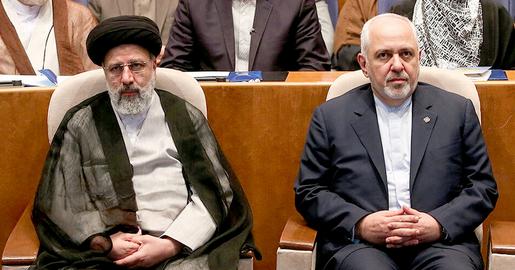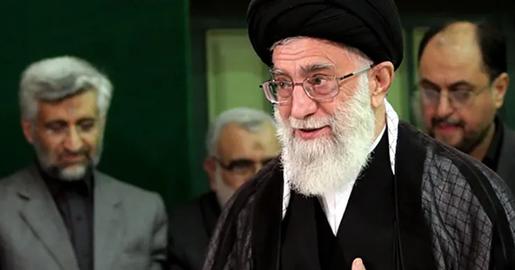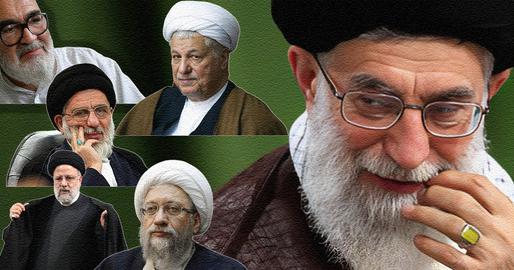In mid-January, cleric Hassan Khomeini gave a short speech in which he said that he would appeal the Guardian Council’s decision to disqualify him as a candidate to the Assembly of Experts, the body responsible for selecting and supervising the supreme leader of the Islamic Republic. But at the time, he also acknowledged that the council members were unlikely to change their minds.
“If the gentlemen can’t certify me now after religious authorities have given their testimonies, it’s unlikely that they will in the future,” he said.
And, on Wednesday, February 10, 2016, Hassan Khomeini, grandson of Ayatollah Khomeini, was proven right, as the Guardian Council rejected his application once and for all. The decision is widely seen as a serious political setback for him.
Since November 9, 2015, the day Khomeini announced his candidacy, many political analysts and activists have spoken more about the possibility of him becoming the next leader of the Islamic Republic than they have about his qualifications as an Assembly candidate. He has been seen by many as a potential representative for both the Khomeini family and the reformist camp in Iran.
“Leader” and “Scholar”
In the spring of 2015, former president Hashemi Rafsanjani praised Hassan Khomeini during a ceremony honoring his grandmother, referring to him as a “scholar.” Following this, reformists praised him as a religious authority — an accolade that holds significant political kudos in Iran. The media published photographs of Hassan Khomeini teaching in the classroom, and other religious authorities showered him with compliments. Reformists were aware this would be significant for the future. But, equally, so were his opponents.
Then, on December 19, numerous reformist newspapers covered their front pages in his honor. He was referred to as the “Second Khomeini,” but a much younger and more handsome version. At least two of the titles bestowed on him — “Future Leader” and the “Second Khomeini — were a direct play on the long-running competition between Akbar Hashemi Rafsanjani and Supreme Leader Ayatollah Khamenei.
Now that Hassan Khomeini was in the running for the elections to the Assembly of Experts, the whole situation became extremely sensitive, especially for the reformists. Suddenly, they had a young candidate that would not only strengthen Rafsanjani’s allies in the Assembly of Experts, but who could represent them too. His presence would have a positive effect on them during the parliamentary elections and would compensate for former president Mohammad Khatami’s absence. It would also give more weight to the House of Khomeini when it dealt with the House of Khamenei in the future.
However, several factors were emerging in the background, which ultimately proved fatal to Hassan Khomeini’s candidacy for the Assembly.
Lack of Political Stamina
Firstly, Hassan Khomeini lacked the political stamina of his competitors. In his most aggressive speech, delivered on January 29, he portrayed himself as both a loser and a victim when he said that he would protest his disqualification as some had asked him to. He also failed to convincingly explain why he never participated in the written test usually required as part of the qualification process for running as an Assembly of Experts candidate.
In addition to that, he avoided the media for the most part, and then on the day candidates put forth their applications for registration, he used the fact that he had a cold as an excuse to speak as little as possible. Instead, it was the Jamaran website, which ran the PR for his campaign, that was given the task of continuously denying rumors and reports about him.
No Platform
But above all else, Hassan Khomeini failed because he could not offer a clear political campaign that defined him as a distinct candidate. He generally showed himself to be an inexperienced and unskilled politician. When he announced his candidacy on December 8, he simply announced that he was independent. His brother Ali Khomeini — who conservatives have tended to trust more — tried to calm his opponents. At the same time, his supporters portrayed him as a dyed-in-the-wool reformist.
Those opposing Khomeini portrayed his bid for the candidacy as a “conspiracy” — a refrain much loved by Iranian politicians and influential clerics when trying to undermine legitimacy, whether that of an individual or of a type of behavior. Much of the electoral game for the Assembly of Experts happens behind closed doors among a range of different religious bodies and alliances. For instance, the reason Mahmoud Hashemi Shahroudi — who has close ties to Ayatollah Khamenei and served on a number of important councils — did not become chairman of the Assembly of Experts can only be explained in the context of internal political rivalries among Iran’s influential clerics.
How did the reformists get it so wrong?
Unfortunately, reformists, and crucially, reformist media, did not quite understand the rules of the game, or how the alliance between Hassan Khomeini and Akbar Hashemi Rafsanjani would factor in to the end result.
When it came to Khomeini’s bid for candidacy, Rafsanjani employed a complex strategy. He praised his credentials as a scholar, but was so insistent that the Guardian Council accept his candidacy that he was bound to fail. Then, when the council disqualified him, he sharply criticized the decision.
But in general, reformist politicians kept relatively silent on Khomeini’s disqualification. There was a clear reason for this. For them, becoming involved in Assembly of Experts elections meant trouble, not least because showing their allegiance to Khomeini could potentially jeopardize their own efforts to run for parliament seats. Perhaps they believed that trying to secure approval from religious authorities and Qom clerics as a way of applying pressure on the Guardian Council was a safer option. But this backfired: clerics remained cautious and one after another, they refused to back Khomeini. And when Mohammad Yazdi, a member of the Guardian Council and the head of the Society of Qom Seminary Teachers, spoke out publicly against these attempts, reformists knew this approach was misguided.
Khomeini and his allies also underestimated the power of his enemies. Reformists knew that Khomeini’s knowledge of Islamic jurisprudence was solid, but they wrongly assumed that this reputation could exempt him from taking the written test. And this is where the Guardian Council and its Chairman Ali Jannati got the upper hand — using this technicality to take him out of the running. Reformists accused Jannati and his allies of trying to make Khomeini take the test in order to fail him. While their accusations of political maneuvering had merit, it did not change the fact that this technicality could be used, and used powerfully.
Still, many reformists were hoping the supreme leader would give the go-ahead for Khomeini by issuing a so-called “government decree.” Such a decree is binding under Iran’s political system. But there is another decree that is even more powerful: the “Imam’s decree,” decisions that date back to the time of Hassan Khomeini’s grandfather, and which were issued by the founder of the Islamic Republic himself.
For example, the religious endowment for the Shrine of Imam Reza in Mashhad has been exempt from paying taxes because of such a decree. The “Imam’s decrees” also bestow legitimacy, and in recent weeks, hardliners have said that Ali Jannati’s decisions are indeed legitimized by such a decree. Reformists — particularly Hashemi Rafsanjani — tried to argue that the fact that Hassan Khomeini is the grandson of Ayatollah Khomeini meant he was protected by the “Imam’s decree” too, but, in the end, it was not an argument that stuck.
A Missed Opportunity
But had Hassan Khomeini been able to participate in the elections, and had he won, he could benefit from both types of decrees. His qualification would have signaled that he had the approval of the current supreme leader. And there is good reason to believe that he would have received an impressive number of votes in Tehran.
But these dreams have now vanished. And given that Hassan Khomeini has a somewhat cautious character, it is unlikely that he will be able to exploit what has happened to him and turn himself into a “political objector.” He could put himself forward as the leader of the reformists in the forthcoming parliamentary elections, and present his own list of candidates — but he appears to have little interest in doing this.
What is more likely is for the media to go back to the earlier image of Khomeini, and start running photographs of him in his role as a pedagogue, teaching seminary students and ensuring the future is full of young people equipped with Islamic values. For now, it seems to be the best way to present himself as the grandson of Ayatollah Khomeini, the founder of the Islamic Republic.
Related articles:
Khomeini’s Grandson Disqualified from Elections
Khomeini’s Grandson Enters Politics
























comments